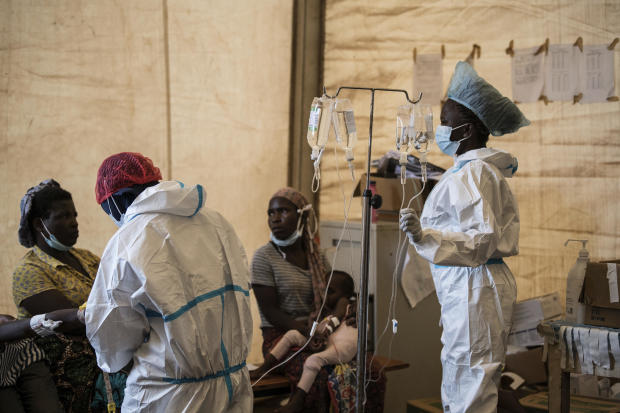Worst-ever cholera outbreak in Malawi kills more than 1,200, with “very high” risk of spread
[ad_1]
Thoko Chikondi/AP
Brazzaville — The deadliest cholera outbreak in Malawi‘s history has killed at least 1,210 people, while vaccines remain scarce and several other African nations report outbreaks, the World Health Organization said Thursday. The southern African nation has been battling its worst cholera outbreak on record, with nearly 37,000 cases reported since March 2022.
Confirmed cases have already been reported across the border in Mozambique, while the WHO said it assessed the current risk of spread inside Malawi and to other neighboring countries as “very high.”
The WHO said in a statement that active transmission was now ongoing in 27 out of Malawi’s 29 districts, with the country seeing a 143-percent increase in the number of cases last month compared to December.
“With a sharp increase of cases seen over the last month, fears are that the outbreak will continue to worsen without strong interventions,” WHO warned in a statement.
But the UN health agency pointed out that the crisis in Malawi is occurring against a backdrop of surging cholera outbreaks worldwide, which have “constrained the availability of vaccines, tests and treatments.”
Thoko Chikondi / AP
Some 80,000 cases were recorded on the African continent over the whole of 2022.
“If the current fast-rising trend continues, it could surpass the number of cases recorded in 2021, the worst year for cholera in Africa in nearly a decade,” the WHO said.
Since the outbreak began, Malawi has carried out two large vaccination campaigns, but due to limited supplies, has offered just one of the usually recommended two oral cholera vaccine doses.
In November, it received the second batch of almost three million doses from the UN, and last month a health ministry spokesman told AFP all the doses had been used.
The WHO said Thursday that 96.8 percent of the population “residing in communities with high risk and burden of cholera” had been reached.
Beyond vaccination, the WHO said efforts were under way to improve sanitation and access to clean water, with house-to-house chlorination ongoing in affected communities and districts, among other interventions.
Cholera, which causes diarrhea and vomiting, is contracted from a bacterium that is generally transmitted through contaminated food or water.
WHO said there was a continued risk of further increases in the number of cases in the Malawi outbreak, and said there could also be more international spread.
Malawi’s neighbor Zambia has also reported cases, according to the WHO. As have Burundi, Cameroon, the Democratic Republic of Congo, Ethiopia, Kenya, Nigeria and Somalia.
The WHO said the current cholera outbreaks in Africa are occurring as the continent faces extreme weather events, conflicts, and as well as overstretched health services.
Late last month, the UN health agency also warned that the risk from the global cholera outbreak was “very high” due to ongoing multiple outbreaks in many WHO regions.
WHO chief Tedros Adhanom Ghebreyesus told reporters Wednesday that there were currently 23 countries in the world experiencing cholera outbreaks, with a further 20 countries that share land borders with them at risk.
“In total, more than one billion people around the world are directly at risk of cholera,” he warned.
[ad_2]
Source link












